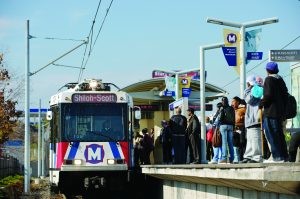 Last week, the City of St. Louis Board of Aldermen approved the Mayor’s nominations to the Economic Development Tax Board, which under state law, will help make determinations on the distribution of Proposition 1 sales tax revenues raised. Individuals appointed include: Richard T. Bradley (president of our Board of Public Service), James J. Dwyer (developer largely in CWE), Alana C. Green (director of our Community Development Administration), Gregory L. Meyer and Tracey J. Johnson.
Last week, the City of St. Louis Board of Aldermen approved the Mayor’s nominations to the Economic Development Tax Board, which under state law, will help make determinations on the distribution of Proposition 1 sales tax revenues raised. Individuals appointed include: Richard T. Bradley (president of our Board of Public Service), James J. Dwyer (developer largely in CWE), Alana C. Green (director of our Community Development Administration), Gregory L. Meyer and Tracey J. Johnson.
The mayor appoints five members of the nine-member board, with the consent of a majority of city aldermen. Two members are appointed by the Board of Aldermen, and the other two will be appointed by St. Louis Public Schools.
More than 60 percent of voters in St. Louis City supported Proposition 1 in April 2017 for MetroLink expansion and economic development. The proposition facilitated a half-cent sales tax increase in the city for “economic development purposes,” including a Northside-Southside MetroLink, neighborhood revitalization, workforce development, public safety, and upgrades to the city’s infrastructure.
The official ballot language read: Shall the City of St. Louis impose a sales tax at a rate of one half of one percent for economic development purposes including (1) North/South Metrolink, (2) neighborhood revitalization, (3) workforce development; (4) public safety, and (5) to upgrade the city’s infrastructure, with annual public audits
Proponents promised about $12 million, or 60 percent of the tax increase, would go towards a MetroLink extension, and $8 million would go to neighborhood revitalization, job training, youth employment, public safety, and street and equipment repair and replacement.
“CMT strongly supports efforts to expand our existing public transportation system. It is critical that existing transit expansion planning initiatives—which in some cases are more than 20 years old—are updated with more current data about potential ridership and financing to objectively determine which projects should rise to the top of the region’s priority list. Our hope and goal is that the next project selected is a regional project providing public transit benefits to both the City of St. Louis and St. Louis County and takes into account not only the rides provided but the economic development and social equity opportunities of light rail ,” said Kimberly Cella, executive director of CMT.